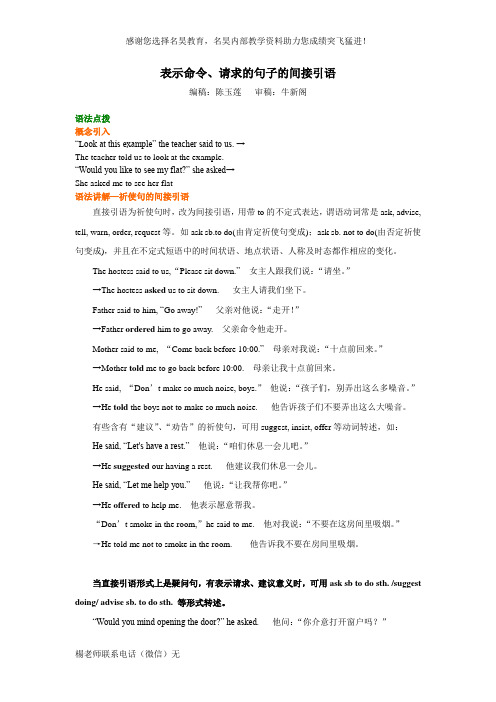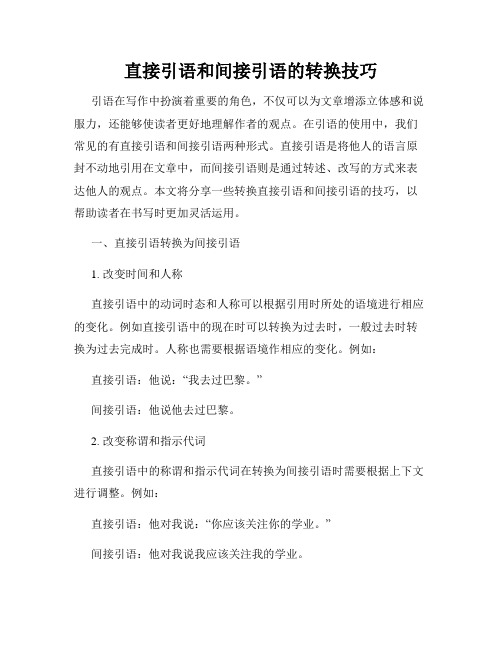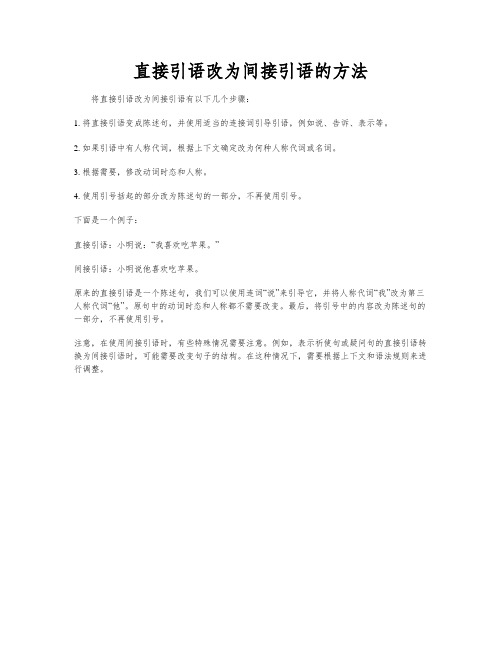祈使句-直接引语变间接引语
- 格式:doc
- 大小:174.50 KB
- 文档页数:36

表示命令、请求的句子的间接引语编稿:陈玉莲审稿:牛新阁语法点拨概念引入“L ook at this example” the teacher said to us. →The teacher told us to look at the example.“Would you like to see my flat?” she asked→She asked me to see her flat语法讲解—祈使句的间接引语直接引语为祈使句时,改为间接引语,用带to的不定式表达,谓语动词常是ask, advise, tell, warn, order, request等。
如ask sb.to do(由肯定祈使句变成);ask sb. not to do(由否定祈使句变成),并且在不定式短语中的时间状语、地点状语、人称及时态都作相应的变化。
The hostess said to us,“Please sit down.”女主人跟我们说:“请坐。
”→The hostess asked us to sit down. 女主人请我们坐下。
Father said to him, “Go away!”父亲对他说:“走开!”→Father ordered him to go away. 父亲命令他走开。
Mother said to me, “Come back before 10:00.”母亲对我说:“十点前回来。
”→Mother told me to go back before 10:00. 母亲让我十点前回来。
He said, “Don’t make so much noise, boys.”他说:“孩子们,别弄出这么多噪音。
”→He told the boys not to make so much noise. 他告诉孩子们不要弄出这么大噪音。
有些含有“建议”、“劝告”的祈使句,可用suggest, insist, offer等动词转述,如:He said, “Let's have a rest.” 他说:“咱们休息一会儿吧。

直接引语和间接引语的转换技巧引语在写作中扮演着重要的角色,不仅可以为文章增添立体感和说服力,还能够使读者更好地理解作者的观点。
在引语的使用中,我们常见的有直接引语和间接引语两种形式。
直接引语是将他人的语言原封不动地引用在文章中,而间接引语则是通过转述、改写的方式来表达他人的观点。
本文将分享一些转换直接引语和间接引语的技巧,以帮助读者在书写时更加灵活运用。
一、直接引语转换为间接引语1. 改变时间和人称直接引语中的动词时态和人称可以根据引用时所处的语境进行相应的变化。
例如直接引语中的现在时可以转换为过去时,一般过去时转换为过去完成时。
人称也需要根据语境作相应的变化。
例如:直接引语:他说:“我去过巴黎。
”间接引语:他说他去过巴黎。
2. 改变称谓和指示代词直接引语中的称谓和指示代词在转换为间接引语时需要根据上下文进行调整。
例如:直接引语:他对我说:“你应该关注你的学业。
”间接引语:他对我说我应该关注我的学业。
3. 改变疑问句和祈使句的语序在转换为间接引语时,疑问句和祈使句的语序需要改变。
例如:直接引语:他问:“你去哪里?”间接引语:他问我去哪里。
二、间接引语转换为直接引语1. 原词引述如果间接引语中的观点需要强调或者引用的内容比较简单直接,可以直接引用原词。
例如:间接引语:他说他很喜欢这本书。
直接引语:他说:“我很喜欢这本书。
”2. 省略词的补充如果在间接引语中省略了一部分内容,可以在直接引语中进行补充。
例如:间接引语:他告诉我他会来,但没有说具体的时间。
直接引语:他告诉我:“我会来,但没有说具体的时间。
”3. 结合原文进行引用如果原文中已经有了引号,并且需要引述其中的内容,可以在直接引语中使用引号。
例如:间接引语:他对我说他最喜欢的电影是《肖申克的救赎》。
直接引语:他对我说:“他最喜欢的电影是‘肖申克的救赎’。
”以上就是直接引语和间接引语的转换技巧。
通过灵活运用这些技巧,我们可以更好地在写作中引用他人的观点,并使文章更加生动有趣。

直接引语变间接引语在转达别人的话时,可以用两种办法:一种是把别人的话原封不动地加以引用,被引用部分就称为直接引语;另一种是用自己的话转述别人的话称为间接引语。
如:He said: “I’m busy with my work.” (直接引语)He said that he was busy with his work. (间接引语)直接引语变为间接引语时要记住“三连”、“三变”。
一、“三连”:1. 如果直接引语是陈述句,变为间接引语时,间接引语的开头用连词that 来引导,但口语中常可省略。
“I don’t want anything,” the boy said.The boy said(that)he didn’t want anything.2. 如果直接引语是一般疑问句,间接引语的开头用连词if(whether) 来引导,并把疑问语序变为陈述语序。
如直接引语是特殊疑问句,仍用原来的特殊疑问词来引导间接引语。
H e asked me “Do you want to go?”He asked me if(whether) I wanted to go.“Which book do you want?” she asked me.She asked me which book I wanted.3. 直接引语是祈使句,用不定式符号to连接间接引语。
如直接引语是否定祈使句,则用not to 连接。
M other said to me, “Come back before 10:00.”Mother told me to come back before 10:00.The teacher said to us, “Don’t be late for the meeting.”The teacher told us not to be late for the meeting.二、“三变”:1.人称代词变化:直接引语中的第一人称,一般转换第三人称;第二人称一般转换为第一人称;第三人称保持不变。

Section ⅣGrammar —直接引语与间接引语(Ⅱ)—祈使句[新知导引]1.(教材P12)“Look at this example,” the teacher said to us.→The teacher told_us_to_look at that example.2.(教材P12)“Would you like to see my flat?” she asked.→She asked_me_to_see_her flat.3.“Don't look out of the window, boys,” said the teacher.→The teacher told_the_boys_not_to_look out of the window.4.He said, “How clever the child is!”→He said_how clever the child was.[语法详解]1.祈使句的直接引语变间接引语,祈使句的间接引语形式多采用“动词+宾语+动词不定式”结构。
常见的引述动词有ask, tell, beg, warn, remind, advise, order等。
引述表示警告或提醒的祈使句用remind, warn等词转述。
*“Take an umbrella in case of rain.”his mother said to him.→His mother reminded him to take an umbrella in case of rain.*The leader said to the workers, “Don't speak while working.”→The leader warned the workers not to speak while working.[名师点津](1)无论是否定祈使句,还是表示委婉语气的否定疑问句,在变为间接引语时,要用不定式的否定形式:①引述表示命令的祈使句,变间接引语时常采用ask/tell/order sb.(not) to do sth.的形式。

直接引语变间接引语的用法由直接引语变为间接引语,分以下情况:1、直接引语是陈述句时间接引语为that引导的宾语从句(口语中that可以省略),主句的引述动词主要有say ,tell, repeat, explain, think等。
He said, "You are younger than I.” He said (that) I was younger than him.2、直接引语是疑问句时间接引语为陈述语序:主句的谓语动词say 改为ask,或改为wonder, do not know, want to know, be not sure, be puzzled等。
(1)一般疑问句或反意疑问句变为if (whether)引导的宾语从句。
She said, "Do you often come here to read newspapers?"→She asked me if (或whether)I often went there to read newspapers.She asked me, "You have seen the film, haven’t you?"→She asked me whether(或if )I had seen the film.(2)选择疑问句变为whether….or 宾语从句。
I asked him, "Will you stay at home or go to a film tonight?"→I asked him whether he would stay at home or go to a film that night.(3)特殊疑问句变为由原来的疑问词引导的宾语从句。
He asked, "Where do you live?" →He asked me where I lived.3、直接引语是祈使句时间接引语为不定式,作ask , tell, beg, order, warn, advise等动词的宾语补足语(don’t 变为not ).The teacher said to the boy, "Open the window." →The teacher told the boy to open the window. His father said to him, “Don’t leave the door open.” →His father told him not to leave the door open.[注意](1)有些表示建议、提议、劝告或要求的祈使句,可以用suggest ,insist等动词加以转述。

直接引语改为间接引语的方法
将直接引语改为间接引语有以下几个步骤:
1. 将直接引语变成陈述句,并使用适当的连接词引导引语,例如说、告诉、表示等。
2. 如果引语中有人称代词,根据上下文确定改为何种人称代词或名词。
3. 根据需要,修改动词时态和人称。
4. 使用引号括起的部分改为陈述句的一部分,不再使用引号。
下面是一个例子:
直接引语:小明说:“我喜欢吃苹果。
”
间接引语:小明说他喜欢吃苹果。
原来的直接引语是一个陈述句,我们可以使用连词“说”来引导它,并将人称代词“我”改为第三人称代词“他”。
原句中的动词时态和人称都不需要改变。
最后,将引号中的内容改为陈述句的一部分,不再使用引号。
注意,在使用间接引语时,有些特殊情况需要注意。
例如,表示祈使句或疑问句的直接引语转换为间接引语时,可能需要改变句子的结构。
在这种情况下,需要根据上下文和语法规则来进行调整。
高考英语专题之祈使句的干脆引语变间接引语一、教学内容祈使句的干脆引语变间接引语二、学问精讲(一)视察下列句子,试着总结、思索祈使句的干脆引语变间接引语的规律。
1. “Make sure the door is shut,” she said to her little son.She told her little son to make sure the door was shut.2. “Don’t smoke in the room,” he said to me.He told me not to smoke in the room.3. Mrs. Hill said, “ please sing at our party, Mary.”Mrs. Hill asked Mary to sing at their party.4. He said to the girl, “Do it at once.”He told the girl to do it at once.总结:祈使句的干脆引语变为间接引语的规律1. 一改:主句谓语动词干脆引语为祈使句,变为间接引语时,谓语动词said/said to常改成ask, advise, tell, warn, order, request等。
2. 二变:呼语变宾语3. 三加:动词前加to4. 四去:please(二)祈使句变为间接引语后,就成了以不定式短语形式出现的宾语补足语,其结构通常为:ask/ advise/ tell/warn/order/ request sb. (not ) to do sth.例:He said,“Be seated, please. ” →He asked us to be seated.She said to me, “Don’t smoke in the classroom.”→She told me not to smoke in the classroom.即学即用:Mary asked me _____ to answer that letter.A. don’t forgetB. not forgetC. not to forgetD. not forgetting答案:C▲留意:1. 有些含有“建议”、“劝说”的祈使句,可用suggest, insist, offer等动词转述。
直接引语变间接引语的方法:从句人称的变化:1)直接引语的主语是第一人称时,变为间接引语时要和主句的主语保持一致。
eg:①They said,“We will go there by bus” 他们说“我们将乘公共汽车去那儿”。
→ They said they would go there by bus. 他们说他们将乘公共汽车去那儿。
②He said,“I am visiting my aunt next week.” → He said that he was vis iting his aunt next week.2)如果直接引语的主语是第二人称,变为间接引语时要与主句的宾语保持一致。
eg: ①She said to me,“Are you interested in science?” 她对我说:“你对自然科学感兴趣吗?” → She asked me if /whether I was interested in science. 她问我是否对自然科学感兴趣。
②He said to me,“You are hard-working.” → He told me that I was hard-working.3)如果直接引语的主语是第三人称时,变为间接引语时人称保持不变。
eg: His mother said to me,“ He can’t go to school.” 他的妈妈对我说:“他不能去上学”。
→ His mother told me that he couldn’t go to school. 他妈妈告诉我他不能去上学了。
从句时态的变化:1)如果主句是一般现在时或一般将来时,直接引语变间接引语时,从局的时态保持不变。
eg: He says,“I am visiting my aunt next week.” 他说:“我下周要去看望我的姑姑”。
→ He says that he is visiting his aunt next week.2)如果主句的时态为一般过去时,从句的时态要做相应的变化。
祈使句的直接引语变间接引语是重要语法点, 现作一小结。
当直接引语的句子是祈使句时, 间接引语常用动词不定式表示; 如果祈使句为否定式, 变为间接引语时, 则将原句变为动词不定式的否定式。
间接引语的动词应根据句子的意思和说话者的口气作相应的改变, 一般将原句的say酌情改为ask, beg, tell, order, demand等动词, 并在动词的后面加相应的人称作宾语。
为使间接引语的语气和意义更贴近原句, 可按下列情况酌情选用不同的谓语动词。
1. 一般情况将原句的动词say改为tell。
例如:①He said, “Hurry up!"→He told me to hurry up.他告诉我快一点。
②She said, “Don't put your bag here, Mary."→She told Mary not to put her bag there.她告诉玛丽不要把袋子放在那里。
③He said, “Never eat too much."→He told /warned us never to eat too much.他告诉我们永远不要吃得太多。
④The teacher said, “Don't be late again, Mary."→The teacher told Mary not to be late again.老师告诉玛丽不要再迟到了。
2. 有的祈使句含有please一词, 以表示婉转的语气, 将这类祈使句变为间接引语, 通常将原句的say改为ask或beg。
值得注意的是, please一词在改为间接引语时去掉。
例如:①Tom said to Alice, “Come here tomorrow, please."→Tom asked Alice to go there the next day.汤姆要求艾丽斯第二天去那里。
祈使句的直接引语变间接引语在第一单元中我们学习了述句和疑问句的直接引语变间接引语的用法,本期主要讲解祈使句的直接引语变间接引语的用法。
先看两个句子:1. “Put your coat in the closet,”the landlord said to him.→ The landlord asked him to put his coat in the closet.2. The father said to his children,“Don't move!”→The father to ld his children not to move.从以上两个句子可以看出:例句1是表示“请求”的口气;例句2是表示“命令”的口气。
由此看来,当我们转述祈使句时,通常将原句中的动词变为动词不定式,并在不定式的前面加上ask, order, tell等转述动词,形成三种结构:①表示邀请、请求某人做某事时用ask sb. to do sth.; ②表示叫、吩咐某人做某事时用tell sb. to do sth.; ③表示命令某人做某事时用order sb. (not) to do sth.。
例如:①She said to us, “Please have a rest.” →She asked us to have a rest.②The old man said, “Don't smoke in the hall.”→The old man told me not to smoke in the hall.③The officer said, “Go away.” →The officer ordered us to go away.注意:当祈使句的直接引语变为间接引语时,因为祈使句表示“请求”、“命令”等口气,所以祈使句直接引语变为间接引语时不存在时态的变化。
但是人称、指示代词、时间、地点状语等的变化还应根据述句直接引语变间接引语的方法进行相应的改变。
例如:One of the doctors said, “Let me go on with the operation, Dr. Bethune.”→ One of the doctors asked Dr. Bethune to let him go on with the operation.不知道同学们注意到没有,该句直接引语中有个称呼语Dr. Bethune,一般把它当作宾语用。
再如:“Go and wash your face, Tom,” Mother said.→Mother told Tom to go and wash his face.顺便提一下,祈使句的间接引语变直接引语也应该遵循述句间接引语变直接引语的方法。
例如: Wei Fang asked him to give it to her. →“Give it to me, please,” Wei Fang said to him.只要同学们认真记住以上三种祈使句直接引语变间接引语的基本结构,相信同学们一定能学会祈使句的直接引语变间接引语。
小试牛刀:A)变下列直接引语为间接引语。
1.“Stop talking!”the monitor said to the class.________________________________________________________________________2. “Repeat it three times,” the teacher said to her.________________________________________________________________________3. “Will you buy some bread for me?” he said to her.________________________________________________________________________4.“Don't take off your coat,” she said to her sister.________________________________________________________________________5. “Stay here!” the officer said to the soldier.________________________________________________________________________B)填空完成间接引语,每空一词。
6. “Don't forget to give the message to my wife,” he said to Li Ping.He _______ Li Ping _______ _______ forget to give the message to _______ wife. 7. “Mum, please help me find my shirt,” he said.He _______ his mother _______ help _______ find _______ shirt.8. “Use your knife to cut the boots open,” the officer said to the guard.The officer _______ the guard _______ _______ _______ knife to cut the boots open.9. “Don't spend too much time on football!” Mother said to me.Mother _______ me _______ _______ _______ too much time on football.10. “Will you sleep and get up early, children?” Father said.Father _______ the children _______ _______ and _______ up early.C)单项选择。
11. “Don't worry about me,” she _______ her sister.A. said toB. referred toC. thanked toD. spoke12. “ _______help me with my English?”she said.A. Shall weB. Do youC. Could youD. Might you13. She told me _______ a noise in the hall.A. don't makeB. not to makeC. make not toD. to make not14. Martin _______ his dog to lie down under the big tree.A. madeB. hadC. promisedD. ordered15. His father asked the boy, “ _______are doing this for?”A. What; youB. Which; youC. Where; weD. Why; weKey:A) 1. The monitor told the class to stop talking. 2. The teacher asked her to repeat it three times. 3. He asked her to buy some bread for him. 4. She asked her sister not to take off her coat. 5. The officer ordered the soldier to stay there.B) 6. told; not to; his 7. asked; to; him; his 8. ordered; to use his 9. told; not to spend10. asked; to sleep; getC)11—15 ACBDADIRECT SPEECH AND INDIRECT SPEECH直接引语与间接引语(1)引述别人的原话称为直接引语,用自己的话转述别人的话,称为间接引语。
它们都是复合句中的宾语从句。
直接引语要放在引号,不用连词连接;间接引语不用引号,通常用连词连接于主句。
转换时应注意:A.引用的原话是述句,改为间接引语时,通常用连词that引导宾语从句,还要根据意思适当改变人称,时态以及时间状语,地点状语等。
当主语的谓语动词是现在时,宾语从句中的动词时态不变;当主句的谓语动词是过去时态时,则宾语从句中的动词时态应作相应的改变。
时态的改变(2)引述的是疑问句时,变为间接引语时,一般疑问句用whether 或if来引导,选择疑问句只能用whether,特殊疑问句用原来的疑问词。
不论一般或特殊疑问句,变间接引语时,通常按原述句的语序,即把动词放在主语的后面。
“Are you feeling better today?” the doctor asked my sister.The doctor asked my sister if she was feeling better that day?“Is this book yours or his?” She asked me.She asked me whether that book was mine or his.(只能用whether)He asked me ,“Why didn’t you come here yesterday?”He asked me why I hadn’t gone there the d ay before.(3)引用的原句如果是祈使句,变为间接引语时,句字的谓语动词要用含有祈使意义的动词如tell, ask, order(命令)。
引语的动词要改为不定式。
如果祈使句是否定形式,在动词不定式前加not.He said to me,“Tell me something about the film.”He asked me to tell him something about the film.The teacher said to the students,“Don’t open your books.”The teacher told the students not to open their books.Exercises1.Paul said,“It is high time we left the place.”2.He said,“If what you said is true I must go to the police.”3.He said,“After the lecture I had to rush hom e.”4.Mary said,“When I saw them last they were listening to the recording.”5.“I am starting the work the day after tomorrow,” Mike said.6.1.1)当直接引语是述句时,间接引语通常用that引导,that也可以省略。